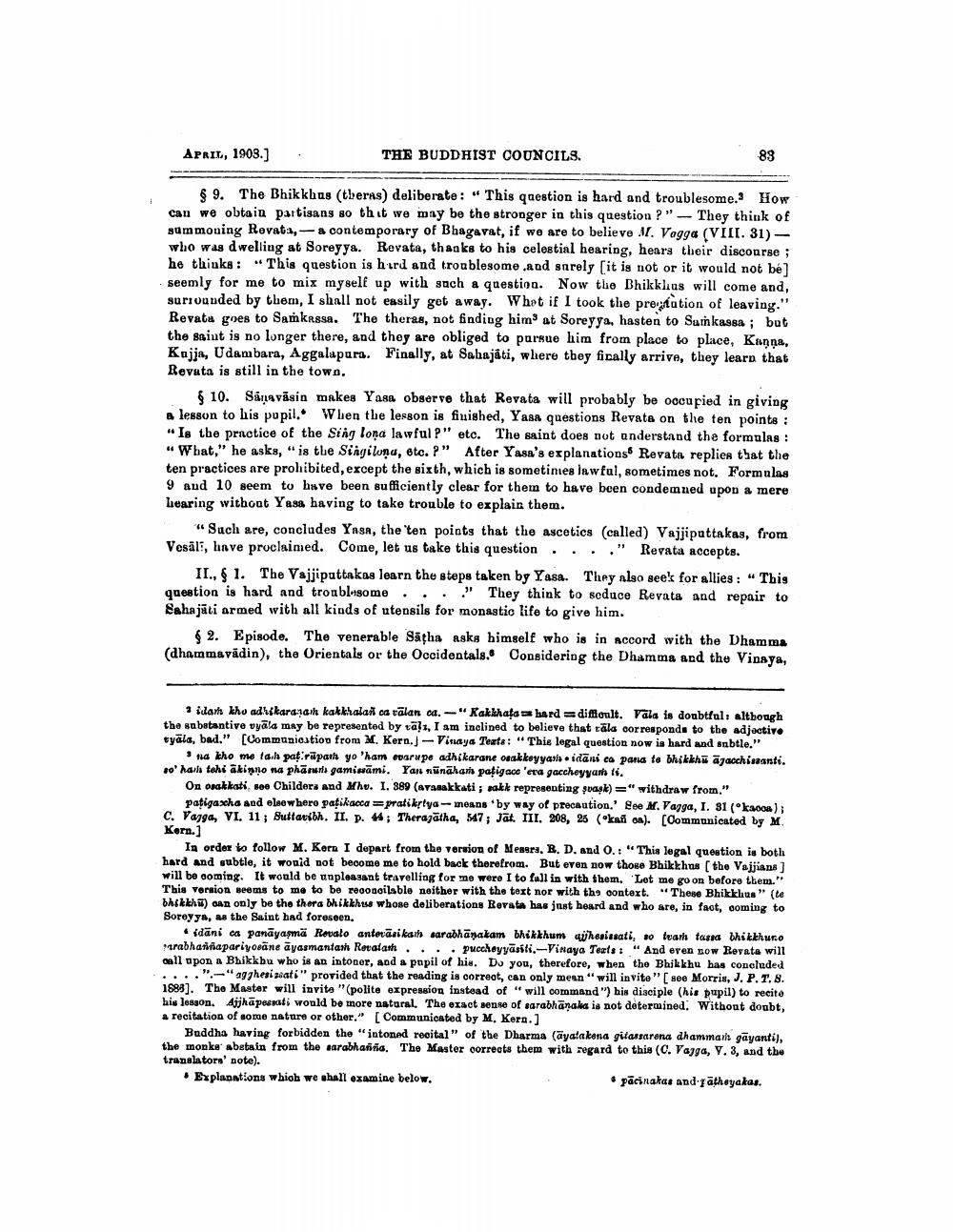________________
APRIL, 1903.)
THE BUDDHIST COUNCILS.
$ 9. The Bhikkhus (theras) deliberate : “ This question is hard and troublesome. How can we obtain partisans so that we may be the stronger in this question ?" -They think of summoning Revat, - a contemporary of Bhagavat, if we are to believe II. Vagga (VIII. 31) who was dwelling at Soreyya. Revata, thanks to his celestial hearing, hears their discourse ; he thinks: "This question is hard and troublesome and surely (it is not or it would not bé] seemly for me to mix myself up with such a question. Now the Bhikklus will come and, surrounded by them, I shall not easily get away. Whet if I took the prestation of leaving." Revata goes to Saṁkrssa. The theras, not finding him at Soreyya, hasten to Sumkassa ; but the saiut is no longer there, and they are obliged to pursue him from place to place, Kaņņa, Kajja, Udambara, Aggalapura. Finally, at Sahajäti, where they finally arrive, they learn that Revata is still in the towo.
10. Sánnväsin makes Yasa observe that Revata will probably be oocupied in giving a lesson to his pupil. When the lesson is finished, Yasa questions Revata on the ten points : "Is the practice of the Sing loņa lawful ?" etc. The saint does not understand the formulas: "Wbat," he asks, " is the Singi luna, etc.?" After Yasa's explanations Revata replies that the ten practices are prohibited, except the sixth, which is sometimes lawful, sometimes not. Formulas 9 and 10 seem to have been sufficiently clear for them to have been condemned upon a mere Learing without Yasa having to take trouble to explain them.
Such are, concludes Yasa, the 'ten points that the ascetics (called) Vajjipattakas, from Vesal, have proclaimed. Come, let us take this question...." Revata accepts.
II., $1. The Vajjiputtakas learn the steps taken by Yasa. They also seek for allies : " Thig question is hard and troublesome...." They think to seduce Revata and repair to Sahajūti armed with all kinds of utensils for monastio life to give him.
62. Episode. The venerable Satha asks himself who is in accord with the Dhamma (dhammavadin), the Orientals or the Occidentals. Considering the Dhamma and the Vinaya,
1 Idanh kho ad ukaranah kakkhalan os välan on. "Kakkhafa hard dimloult. Vala is doubtful: although the substantive vyāla may be represented by tal, I am inclined to believe that räla oor responds to the adjective tyäla, bad." [Communication from M. Kern. -Vinaya Texts: "This legal question now is hard and subtle."
Na kho me fail patrüpath yo 'ham warpe adhikarane osakkoyyarlaidāni ca pana to bhikkhu ägacchinanti. ro' hail tehi akip na phārura gaminami. Yan nünāhari pagigace 'era gaccheyyants.
On osakkati, see Childers and Mhu. I. 389 (avasakkati; sokk representing svask) =" withdraw from."
patigaxha and elsewhere pafikacca = pratiklya-means by way of precaution.' Be M. Vagga, I. 81 (kacoa) c. Yaga, VI. 11; Suttavibh. II. p. 46; Therajatha, 547; Jāt. III, 208, 25 (kañ ca). [Communicated by M Kern.]
In order to follow M. Korn I depart from the version of Meagra, R. D. and O.: "This legal question is both hard and subtle, it would not become me to hold back therefrom. But even now those Bhikkhus (the Vajjians) will be coming. It would be unpleasant travelling for me were I to fall in with them. Let me go on before them." This version seems to me to be reconcilable neither with the text nor with the context. "These Bhikkhus" (te bhikkhi) can only be the thora bhikkhuss whose deliberations Revata has just heard and who are, in fact, coming to Soreyya, as the Saint had foreseen. • idāni ca panāyasmä Revalo anteräsikah sarabhānakam bhikkhum qühesissati, po tvar tanta bhikkhuro
mantam Roraram.... puccheyyüsili.-Vinaya Terla: "And eren sow Revata will call upon a Bhikkhu who is an intoner, and a pupil of his. Do you, therefore, when the Bhikkhu has concluded ....".-"agghesi pati" provided that the reading is correct, can only mean "will invite" (see Morris, J. P.T. 8. 1889). The Master will invite "(polite expression instead of " will command") his disciple (his pupil) to recite his losgon. Ajjhāpessati would be more natural. The exact sense of sarabhānaka is not determined. Without doubt, a recitation of some nature or other." [ Communicated by M. Kern.]
Buddha having forbidden the "intoned recital" of the Dharma (āyata kena gitassarena dhammals gāyanti), the monks abstain from the sarabhañiñia. The Master corrects them with regard to this (C. Vajga, Y. 3, and the translators' note). . Explanations whiob we shall examine below.
• Facinatas and fatheyekas.




